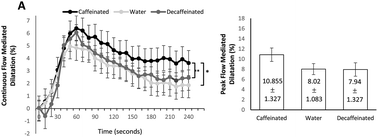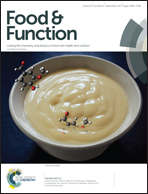The acute effect of coffee on endothelial function and glucose metabolism following a glucose load in healthy human volunteers†
Abstract
A diet rich in plant polyphenols has been suggested to reduce the incidence of cardiovascular disease and type 2 diabetes mellitus, in part, via improvements in endothelial function. Coffee is a rich source of phenolic compounds including the phenolic acid, chlorogenic acid (CGA). The aim of the study was to investigate the effect of coffee as a whole beverage on endothelial function, blood pressure and blood glucose concentration. Twelve healthy men and women were recruited to a randomised, placebo-controlled, cross-over study, with three treatments tested: (i) 18 g of ground caffeinated coffee containing 300 mg CGA in 200 mL of hot water, (ii) 18 g of decaffeinated coffee containing 287 mg CGA in 200 mL of hot water, and (iii) 200 mL of hot water (control). Treatment beverages were consumed twice, two hours apart, with the second beverage consumed simultaneously with a 75 g glucose load. Blood pressure was recorded and the finger prick glucose test was performed at time = 0 and then every 30 minutes up to 2 hours. Endothelial function, assessed using flow-mediated dilatation (FMD) of the brachial artery, was measured at 1 hour and a blood sample taken at 2 hours to measure plasma nitrate/nitrite and 5-CGA concentrations. The FMD response was significantly higher in the caffeinated coffee group compared to both decaffeinated coffee and water groups (P < 0.001). There was no significant difference in the FMD response between decaffeinated coffee and water. Blood glucose concentrations and blood pressure were not different between the three treatment groups. In conclusion, the consumption of caffeinated coffee resulted in a significant improvement in endothelial function, but there was no evidence for benefit regarding glucose metabolism or blood pressure. Although the mechanism has yet to be elucidated the results suggest that coffee as a whole beverage may improve endothelial function, or that caffeine is the component of coffee responsible for improving FMD.



 Please wait while we load your content...
Please wait while we load your content...